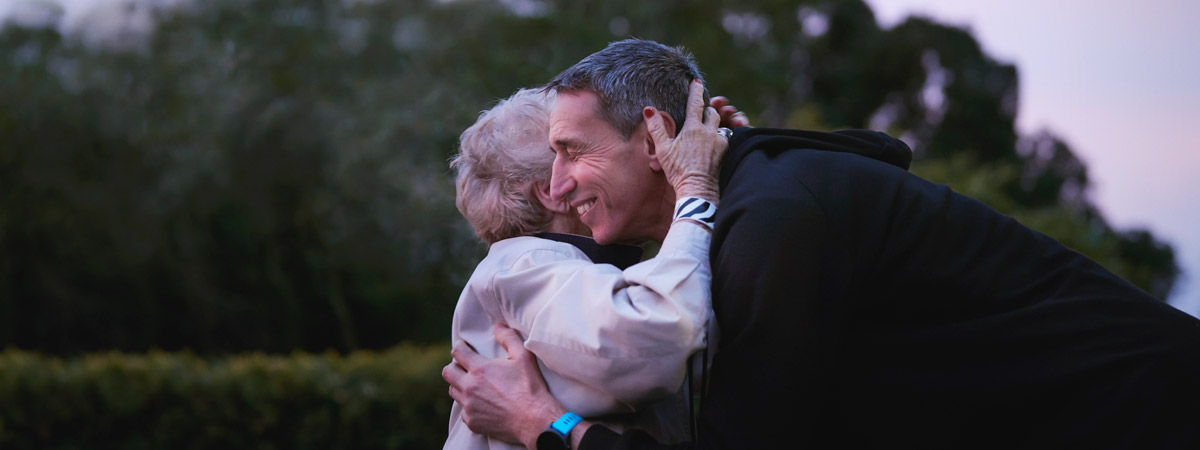Life Insurance
Lump sum payment if you were to pass away or are diagnosed with a terminal illness.
Ian Jones - 5 min read
11 December 2020
AIA Vitality Ambassador Ian Jones knows a thing or two about the importance of giving. Here, he shares how simple acts of kindness can benefit everyone - especially at Christmas.

When you talk about ‘paying it forward’, a lot of people think that you need to spend money. Some people might not be in a position to make a donation to a charity, buy gifts, or buy someone a bag of groceries. But the most powerful acts of giving don’t have to involve money. And as we gear up for the festive season, when the idea of ‘giving’ takes centre stage, I think that’s important to remember.
To me, the idea of paying it forward means giving yourself and your time. Time is the greatest gift you can give to another person. Time doesn’t cost you anything, but it can change someone’s day, and have a huge impact on your own self-esteem too. And we all have time to offer, even the busiest people in the world. You just need to make it a priority.
Now, more than ever, the world needs kindness. Kindness has so many benefits to ourselves and others. It benefits our health; creates a sense of belonging, improves our happiness and mental health, and can even reduce stress and anxiety.
One of the best ways to communicate kindness is through giving. It can be as simple as smiling at a stranger as they walk past you on the street, or helping carry someone’s shopping to their car. And when you do those things, it makes you feel good about yourself too.
This year has been a challenging one for everyone. No one has avoided the effects of COVID-19. We used to live in this certain world where we knew most things that would happen, like our work and our routines. Everything’s much more up in the air now. People are struggling financially and emotionally. Some people are lonely.
So if you see an opportunity – perhaps someone’s struggling with their groceries, or they’re just looking a little lost – go over and say “Hey! How’s your day going? What’s happening with you? Can I give you a hand with those bags? Let me buy you a cup of coffee.” Those sorts of conversations can really help. Especially when you see that person a week later and they say “Hey, thanks for that. I really needed it.”
"When you give someone your time or your energy, you get it back in return. "
In 2020, we’ve all learnt some lessons, but the biggest one, I think, is the importance of a strong community; getting to know the people in your neighbourhood, and knowing that you’ve got support if you find yourself in a crisis.
The other big one is being really grateful for what you have in life. When you practice gratitude, you’re more likely to show acts of kindness, which will then lead others to show acts of kindness. That’s the true notion of paying it forward really – everybody benefits.
It’s why we started Eddie’s Meals, our community food kitchen. There was so much loneliness and isolation in our community – a lot of people were doing it tough. My family and I have a blessed life, which we wanted to share with others. So, every Friday we cook up a big meal with our wonderful volunteers, and we sit down and have a chat with everyone who turns up. We make it an occasion and something to look forward to.
When you give someone your time or your energy, you get it back in return. The stories that we hear from people who turn up to Eddie’s Meals are so inspiring, hearing about people from different backgrounds and the journeys they’ve taken to get to where they are now. You may well decide to stay home after a heavy week and blob out, and that’s okay, but we’ve chosen to put our energy into the community – that’s what’s important for us, particularly at this time of year.

This content is sponsored by AIA Vitality NZ
AIA Vitality is a personalised, health and wellbeing programme that supports you every day to make healthier lifestyle choices.
Disclaimer:
The information in this article is general information only and is not intended as financial, medical, health, nutritional, tax or other advice. It does not take into account any individual’s personal situation or needs. You should consider obtaining professional advice from a financial adviser and/or tax specialist, or medical or health practitioner, in relation to your own circumstances and before acting on this information.